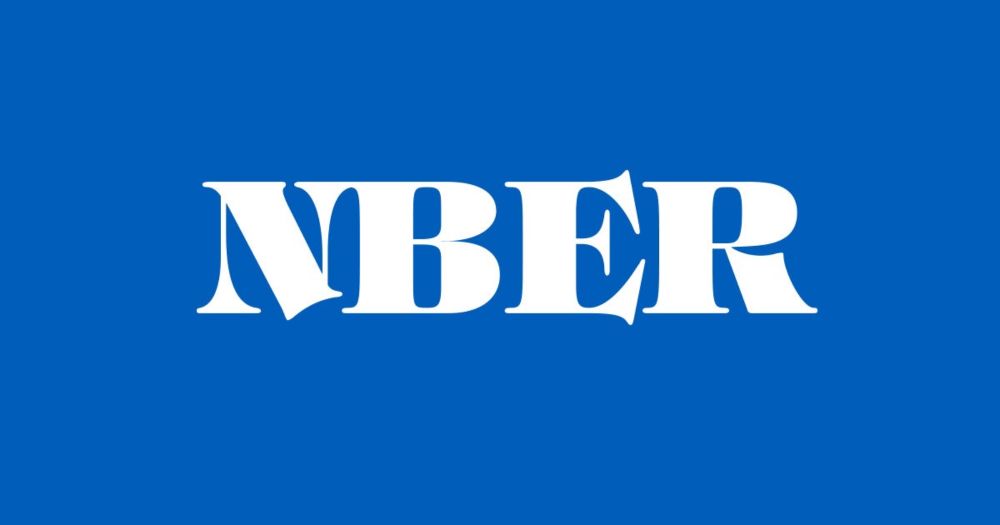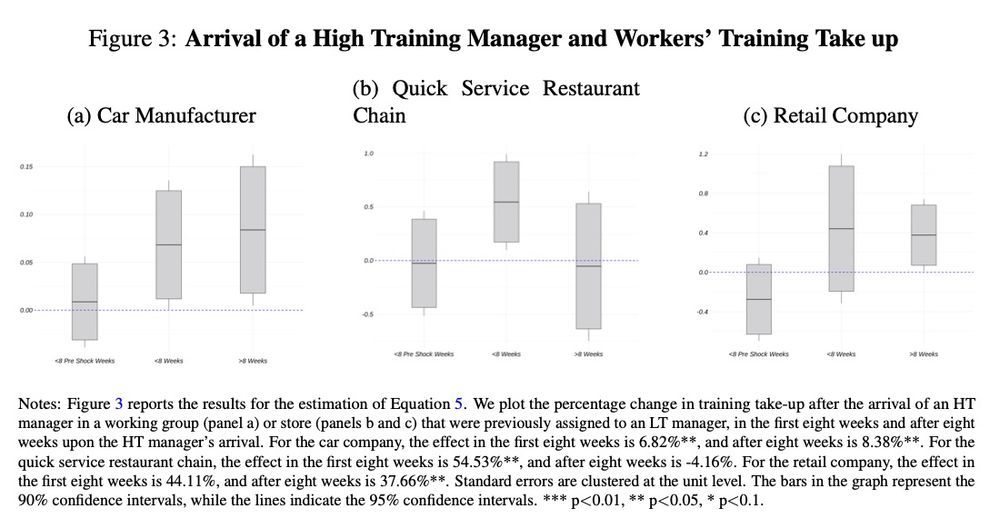
Raffaella Sadun
@raffasadun.bsky.social
Professor at Harvard Business School. Director of the NBER Organizational Economics working group. Co-Director of the Digital Reskilling Lab at HBS. https://www.hbs.edu/faculty/Pages/profile.aspx?facId=541712
In short: good management doesn’t just improve performance—it reshapes organizations.
With Rachel Schuh, John Hartley, @nickbloom.bsky.social and @johnvanreenen.bsky.social .
Full paper 👉 www.nber.org/papers/w33765
#economics #productivity #management #reallocation #research
With Rachel Schuh, John Hartley, @nickbloom.bsky.social and @johnvanreenen.bsky.social .
Full paper 👉 www.nber.org/papers/w33765
#economics #productivity #management #reallocation #research
May 12, 2025 at 2:59 PM
In short: good management doesn’t just improve performance—it reshapes organizations.
With Rachel Schuh, John Hartley, @nickbloom.bsky.social and @johnvanreenen.bsky.social .
Full paper 👉 www.nber.org/papers/w33765
#economics #productivity #management #reallocation #research
With Rachel Schuh, John Hartley, @nickbloom.bsky.social and @johnvanreenen.bsky.social .
Full paper 👉 www.nber.org/papers/w33765
#economics #productivity #management #reallocation #research
Key takeaways:
— Well-managed firms buy, sell, open, and close more plants
— They pass on good practices to new and acquired units
— Banning M&A would lower GDP and management quality by ~15%
— About 20% of productivity gaps across countries are management-related
— Well-managed firms buy, sell, open, and close more plants
— They pass on good practices to new and acquired units
— Banning M&A would lower GDP and management quality by ~15%
— About 20% of productivity gaps across countries are management-related
May 12, 2025 at 2:59 PM
Key takeaways:
— Well-managed firms buy, sell, open, and close more plants
— They pass on good practices to new and acquired units
— Banning M&A would lower GDP and management quality by ~15%
— About 20% of productivity gaps across countries are management-related
— Well-managed firms buy, sell, open, and close more plants
— They pass on good practices to new and acquired units
— Banning M&A would lower GDP and management quality by ~15%
— About 20% of productivity gaps across countries are management-related
📄 Paper w/ Brayan Diaz, Andrea Neyra Nazarrett, Julian Ramirez, Raffaella Sadun, Jorge Tamayo
NBER Working Paper #33670
👉 www.nber.org/papers/w33670
NBER Working Paper #33670
👉 www.nber.org/papers/w33670

Training within Firms
Founded in 1920, the NBER is a private, non-profit, non-partisan organization dedicated to conducting economic research and to disseminating research findings among academics, public policy makers, an...
www.nber.org
April 14, 2025 at 3:55 PM
📄 Paper w/ Brayan Diaz, Andrea Neyra Nazarrett, Julian Ramirez, Raffaella Sadun, Jorge Tamayo
NBER Working Paper #33670
👉 www.nber.org/papers/w33670
NBER Working Paper #33670
👉 www.nber.org/papers/w33670
So what’s the takeaway?
If you want training to work, you need more than money or policy.
You need middle managers who believe in people—and are trusted in return.
If you want training to work, you need more than money or policy.
You need middle managers who believe in people—and are trusted in return.
April 14, 2025 at 3:55 PM
So what’s the takeaway?
If you want training to work, you need more than money or policy.
You need middle managers who believe in people—and are trusted in return.
If you want training to work, you need more than money or policy.
You need middle managers who believe in people—and are trusted in return.
Why? We built a simple model:
Workers only invest in training if they trust that promotions will follow. That trust is manager-specific.
A good manager makes incentives real.
Workers only invest in training if they trust that promotions will follow. That trust is manager-specific.
A good manager makes incentives real.
April 14, 2025 at 3:55 PM
Why? We built a simple model:
Workers only invest in training if they trust that promotions will follow. That trust is manager-specific.
A good manager makes incentives real.
Workers only invest in training if they trust that promotions will follow. That trust is manager-specific.
A good manager makes incentives real.
nd it went beyond training.
Teams led by HT managers:
✅ Performed better
✅ Were promoted more
✅ Had less absenteeism—even during major organizational changes.
Teams led by HT managers:
✅ Performed better
✅ Were promoted more
✅ Had less absenteeism—even during major organizational changes.
April 14, 2025 at 3:55 PM
nd it went beyond training.
Teams led by HT managers:
✅ Performed better
✅ Were promoted more
✅ Had less absenteeism—even during major organizational changes.
Teams led by HT managers:
✅ Performed better
✅ Were promoted more
✅ Had less absenteeism—even during major organizational changes.
These “High-Training” (HT) managers didn’t get paid more for encouraging training. But they nudged, supported, and believed in their team’s growth.
When an HT manager arrived, participation jumped:
📊
When an HT manager arrived, participation jumped:
📊

April 14, 2025 at 3:55 PM
These “High-Training” (HT) managers didn’t get paid more for encouraging training. But they nudged, supported, and believed in their team’s growth.
When an HT manager arrived, participation jumped:
📊
When an HT manager arrived, participation jumped:
📊
That variation could be explained by one thing: who the middle manager was.
Managers who were people-focused, proactive, and cared about development boosted training take-up by 45–60% compared to others.
Managers who were people-focused, proactive, and cared about development boosted training take-up by 45–60% compared to others.
April 14, 2025 at 3:55 PM
That variation could be explained by one thing: who the middle manager was.
Managers who were people-focused, proactive, and cared about development boosted training take-up by 45–60% compared to others.
Managers who were people-focused, proactive, and cared about development boosted training take-up by 45–60% compared to others.
We studied 3 large Latin American firms—a car manufacturer, a retailer, and a fast-food chain. All three offered centrally designed, firm-specific training. Same incentives, same structure.
But participation varied dramatically across teams.
But participation varied dramatically across teams.
April 14, 2025 at 3:55 PM
We studied 3 large Latin American firms—a car manufacturer, a retailer, and a fast-food chain. All three offered centrally designed, firm-specific training. Same incentives, same structure.
But participation varied dramatically across teams.
But participation varied dramatically across teams.

